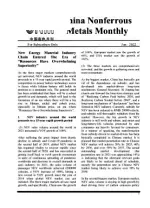Zhejiang Cuts Aluminum Capacity By 150,000 Tons In 2017
Zhejiang Cuts Aluminum Capacity By 150,000 Tons In 2017
It's learned from the Zhejiang Provincial Commission of Economy and Information Technology that in 2017, Zhejiang Province strictly implemented the central government's work systems and requirements for backward capacity elimination in the specified key industries by reducing 2.7 million tons of steel capacity, 150,000 tons of aluminum capacity, 1,700 tons of copper capacity, 300,000 tons of cement capacity, 30,000 tons of paper capacity, 500,000 standard sheets of leather capacity, 1 billion meters of printing and dyeing capacity and 300,000 kVAh of lead storage battery capacity, and shutting down 8 local coal-fired thermoelectric enterprises, including a total of 24 small thermal power units with a capacity of 196,500 kW. The relevant main equipment of the 72 enterprises involved was dismantled according to the national elimination requirements and the dismantling passed provincial acceptance.
In addition to focusing on capacity elimination in the key industries specified by the central government, Zhejiang has actively formulated and implemented more widely applicable and stricter elimination standards and successfully completed the annual objectives and tasks at the provincial, municipal and county levels. In 2017, the backward and serious excess capacity of 2,690 enterprises from more than 30 industries across the province was eliminated. Among them, the relevant main equipment of 271 enterprises (excluding the industries specified by the central government) that were included into provincial annual tasks was dismantled according to the national requirements and the dismantling passed provincial acceptance. The elimination of backward capacity has saved 1.78 million tons of standard coal and reduced 34,700 tons of main pollutants, creating new space for economic transformation and upgrading.
In addition, in 2017, a total of 47,348 low-level and disorderly enterprises (workshops) that lacked licenses, security measures, legal workplaces or environmental measures were rectified or eliminated and 8,686 small coal-fired boilers were eliminated or upgraded.
 China Nonferrous Metals Monthly2018年5期
China Nonferrous Metals Monthly2018年5期
- China Nonferrous Metals Monthly的其它文章
- Jinfei Kaida Invested in The Construction of Lightweight Aluminum Alloy Auto Rim Project
- PikeResearch: New Energy Greatly Promotes China's Rare Earth Industry
- Remarkable Performance in Lithium Battery Copper Foil Market
- Nonferrous Geological Prospecting Institutions Discover Important Mineral and Rare Metal Reserves
- China will Strictly Control Increase of Aluminum Capacity
- Zinc Production by Province in 2017
